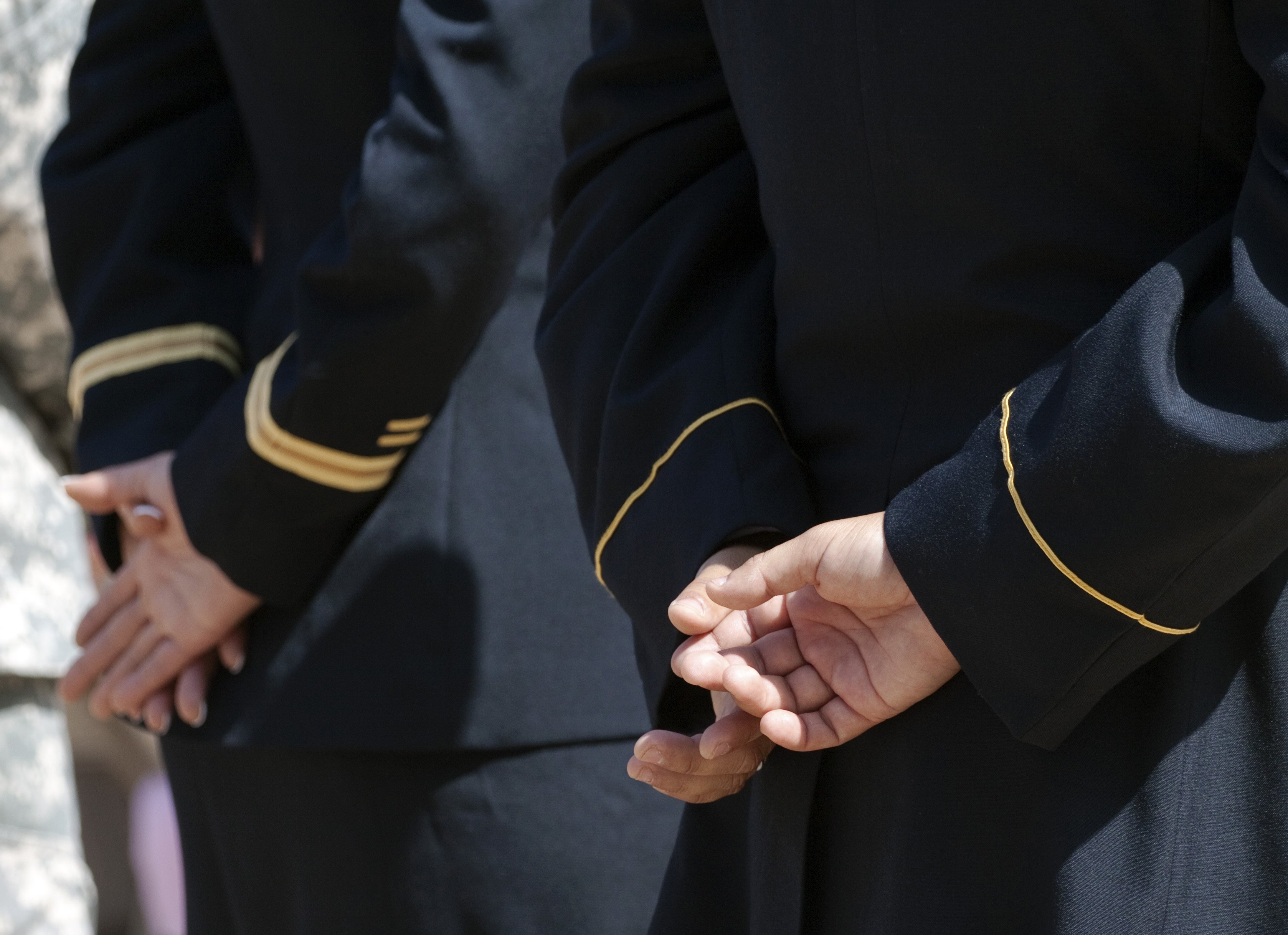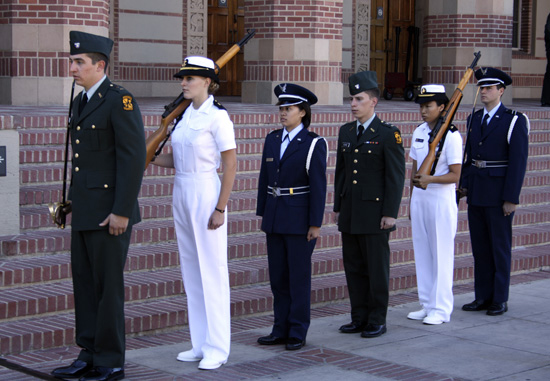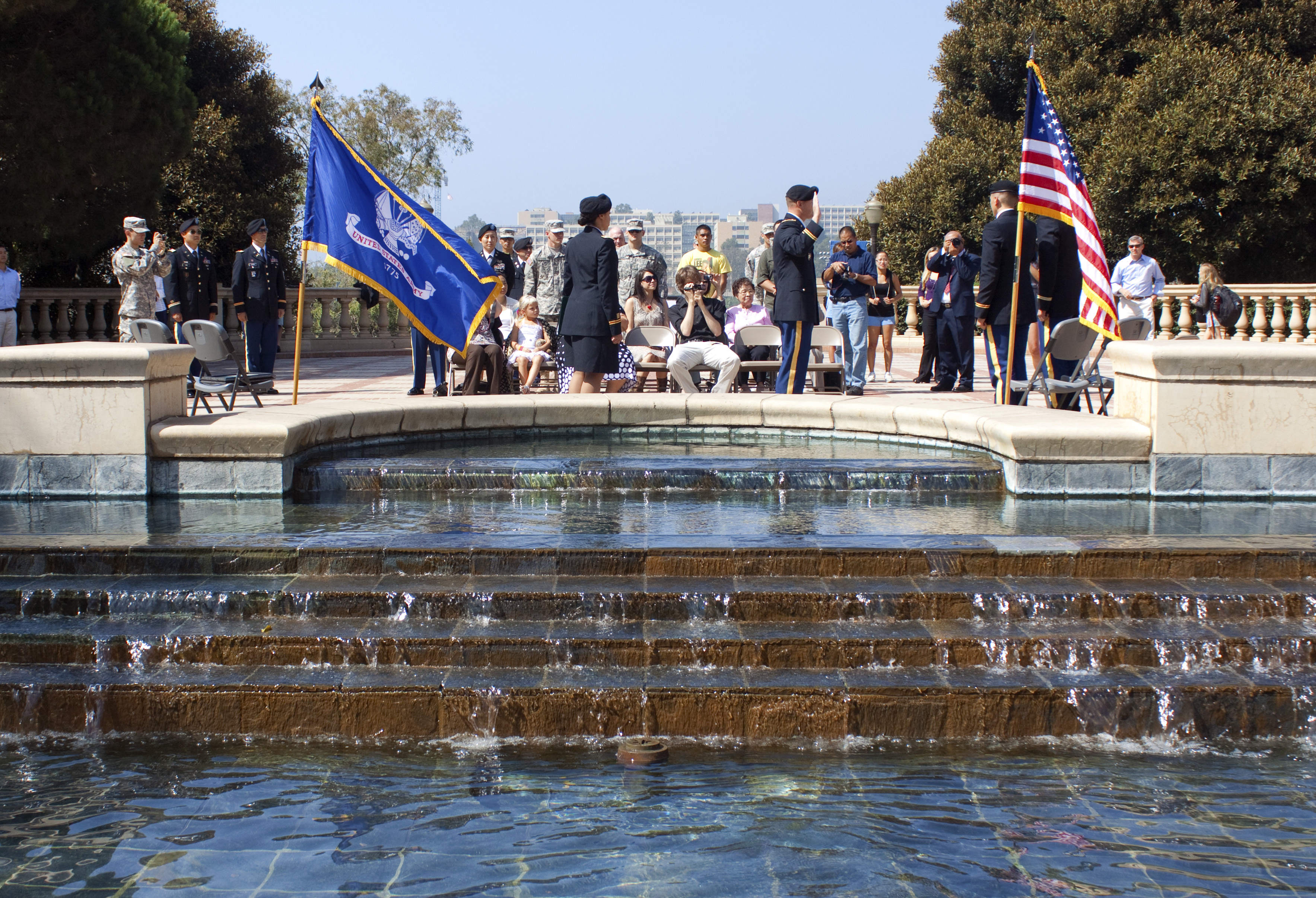
The officers will undergo further training after their Commissioning Ceremony before being deployed.

ROTC students peroform a drill outside of the Student Activities Center during Veteran Day celebrations.
A year ago, Crystal Escobar saw her days at UCLA as a direct path to becoming a pediatrician.
Now, her days are consumed with a different kind of mental and physical preparation ““ military training.
Waking up early a few times a week to condition, the second-year psychology student gets a little closer to preparing her body to run for miles on little sleep, sharpening her mind to think like a soldier and adjusting to a vastly different lifestyle than she anticipated.
When a brochure about military doctors caught her eye last spring, Escobar started to seriously consider the military as a step toward her medical goals, she said.
“I saw it, and for the first time thought to myself, “˜Maybe I can go through with (joining the military) and still become a pediatrician,'” she said.
Escobar has a scholarship offered by the military to pay for the next three years of her undergraduate education. Escobar plans to apply for another scholarship to pay for medical school, she said.
She joined the U.S. Army Reserve Officers’ Training Corps at UCLA ““ known as ROTC ““ at the end of her first year and is now a cadet.
More college students than ever before are now following suit and enlisting in the military.
Since 2009, the number of college graduates joining the military has steadily increased, said Beth Asch, senior economist and associate director of the RAND National Defense Research Institute, a research and policy analysis service that has studied military recruitment for more than 40 years.
“I think the overriding reason is a lack of civilian (job) opportunities,” Asch said. “The military offers job training and employment, and substantially higher pay.”
At UCLA, students like Escobar, who were unsure about the armed forces at first, sometimes join midway through their college careers, said Captain Jennifer Valdivia, the UCLA recruiting officer for the U.S. Army.
“Some are looking for scholarships, some just want to serve their country. … It is not necessarily a career (for everyone),” she said. “But (the military) offers benefits and an experience you won’t get anywhere else.”
Asch said the increase in college graduates entering the military is significant because it is indicative of the state of the economy and a lack of civilian jobs.
“(The military) is becoming more selective, and it’s looking better and better for college students,” Valdivia said. “It’s looking more appealing to kids now than when times were better.”
As of August 2012, the unemployment rate for people between the ages of 20 and 24 was 13.9 percent compared to 6.8 percent for people 25 years and older, according to the Bureau of Labor Statistics.
There are notable distinctions when comparing military and civilian compensation, according to a report from the Congressional Budget Office, which conducts nonpartisan analysis for the U.S. Congress.
In the past decade as civilian pay has decreased, military pay has steadily increased ““ in some recent cases to about 80 or 90 percent more than civilian pay, Asch said.
The military has historically paid more than civilian employment, she said.
The trend of higher military pay in the last decade is partially because of the wars in Iraq and Afghanistan, and partially because of a military retention problem resulting from retirement plan restructuring and other factors in the late 1990s, Asch said. Military personnel typically work in more hazardous conditions and for longer hours than civilian workers, the Congressional Budget Office report stated.
Although the military has been “proactively” recruiting more and more ““ especially on and near college campuses ““ the proportion of college students in the entire armed forces remains relatively small, Asch said.
The number of students graduating from college and entering the U.S. Army, for instance, has about doubled in recent years, Asch said, even though young adults are relatively few in number than other age groups.
The percentage of younger adults in other military branches such as the Air Force is even smaller, she added.
Military recruiters at UCLA have also noticed the trend on campus.
Most military-bound students go through ROTC rather than enlisting at a local recruiting office, Valdivia said. It is harder to become a commissioned officer otherwise, she added.
The benefits of joining the military, such as the guarantee of a job and high salary after college, are not matched by civilian careers, she said.
Escobar, who plans to attend medical school, said she can now afford her undergraduate and medical education ambitions with full scholarships from the ROTC and military, plus a monthly stipend ““ $350 for a second-year cadet.
“There would be some financial struggles without (the money from ROTC),” she said.
After going through the extensive program training, students can become an officer in charge of a platoon right after graduation, Valdivia said.
Crystal Hong, a second-year undeclared student and midshipman in the U.S. Navy and UCLA Naval ROTC, said the main reason she wants to be in the Navy is to help mentor other sailors.
“The money does factor in (though) ““ I’d be lying if I said it didn’t,” Hong said.
Almost daily, Escobar and Hong wake up at 6 a.m. to attend an hour-long physical training session and stay extra hours once a week with fellow ROTC members for “lab day,” a day of hands-on training where students apply tactics they learned in military science classes.
Hong said it is sometimes hard to balance training with the workload of an average student, but the people she met through the Navy end up becoming her best friends, because they go through the experience together.
“The No. 1 benefit (I’ve experienced) so far, is the people you meet, whether they’re in ROTC or stationed officers,” Hong said.
For students like Escobar and Hong, graduation day is now like trading in a cap and gown for a military officer uniform.
And with this comes the possibility of being called into a war zone.
“I am terrified if I ever have to go into a combat zone because I am very close to the people around me,” Escobar said. “So … I know I will constantly be thinking how worried they are for me and how much I wish they were right next to me.”
She is also afraid of dying in combat, she added.
But these fears are not keeping her from serving in the military.
“I am joining the ROTC to be stronger, better person and to serve our country, so I have a lot of pride in what I do, enough to motivate me to keep going despite my fears,” Escobar said.
